HIT CHANNEL EXCLUSIVE INTERVIEW: 12 May 2014. We had the huge honour to talk with a great bass player: Gary Van Scyoc. He was a member of Elephant’s Memory, which was John Lennon’s backing band from 1971 to 1973, then named as Plastic Ono Elephant’s Memory Band (P.O.E.M). Gary played on John Lennon’s “Some Time in New York City” and “Live in New York City” (recorded live at Madison Square Garden) albums and Lennon produced Elephant’s Memory second self-titled album in 1972. He has also played with Chuck Berry, Mick Jagger, Bo Diddley, Stevie Wonder, Jerry Garcia, Paul Simon, Keith Moon, Neil Sedaka, Howard Tate and Yoko Ono. Gary recently released his book “Shortcuts to Improving Your Bass Playing”. Read below the very interesting things Gary told us:
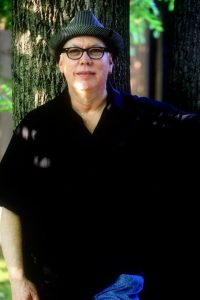 How challenging was the writing process of your book, “Shortcuts to Improving Your Bass Playing”?
How challenging was the writing process of your book, “Shortcuts to Improving Your Bass Playing”?
Actually, it was an easy effort. I have been teaching for so many years. I did it quickly. Instead of writing everything about this subject, I decided to write shortcuts and it just ended up this thing very helpful to my students and to everyone else who is interested.
In 2010, you appeared in “LENNONYC”, a documentary about the life of John Lennon in New York City. Are you satisfied with its final result?
I was very happy with that. I think it was extremely well-produced. Michael Epstein (ed: the director) is just an amazing guy to be interviewed. He did it personally with me and this is one of the reasons that I ‘m very happy with the result. I’m very-very pleased with that.
Were you surprised when John Lennon and Yoko Ono appeared at your rehearsal studio in Greenwich Village unannounced?
(Laughs) That’s a great question. Yeah, I had been totally shocked. There was a buzz in the neighbourhood that they were around. They lived at 105 Bank Street here. It was literally a few doors down from where we rehearsed every day. And there was a buzz in the neighbourhood that they were around and they were shopping around the corner and eating something there. Not total surprise, but professionally yeah. I had no idea that he had received that tape of ours from a radio broadcast we had done. He was given the tape by Jerry Rubin, an anti-war activist here. Anyway, he learned about us and he just showed up.
Were you frustrated when you read the negative reviews on John Lennon’s “Some Time in New York City” (1972) album?
No, I wasn’t personally but of course it was devastating for John, who had been the artist. To be honest with you, in those days I had been in so many records that I really didn’t have the time to think and be involved in the careers of everybody that I was playing, who were the top. Of course, John would be right there at #1. I was working with a lot of other artists at that time: R’n’B, Chess Records as well as other things. But yeah, it was very devastating for John. He was so disappointed. The single for “Some Time In New York City”, the one that was banned on the radio here (ed: I mention to Gary that the single was “Woman Is the Nigger of the World”), that was a kind of a sign that there are maybe some bad things to come. Once you don’t get your singles played by the radio, that can’t be a good thing for the album.
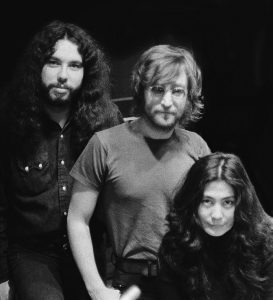 I think it was radio stations’ problem, not John’s. It is a sincere album. He put his soul in this album.
I think it was radio stations’ problem, not John’s. It is a sincere album. He put his soul in this album.
Yeah, he did. His methodology about this album was different. The way he thought about the record, in terms of why he recorded it, it was kind of interesting thing, because he brought a very new approach. He was thinking about every day being a new news story. Every day we went in, there was a new song on a different topic, and we started to record and we couldn’t leave the studio until it was almost finished the next morning. He brought up every day a new song as if you are putting out a new scoop on the latest topic in an everyday newspaper.
How was it like to work with the producer Phil Spector on “Some Time in New York City” album?
It was interesting. He didn’t really care for us. He didn’t really have too much respect for us. In fact, he was only around for the single you have just mentioned and for another one track, I think he was there for “Sunday Bloody Sunday”. And that was it. He was done with the producing of the album, so we never really saw him often again. If I had to give one word to describe how it was like to work with him, that would be: Not good (laughs)
Did you enjoy the “One To One” concert with John and Yoko at Madison Square Garden, which was later released as “Live in New York City”?
Yes, “Live in New York City” -that concert- was probably the biggest one single event of my life, the way things turned out. In terms of playing and in terms of the sound which was so stripped out, and I was so young and I just don’t have so many concerts with him out there. It was such an honour to be with him that night.
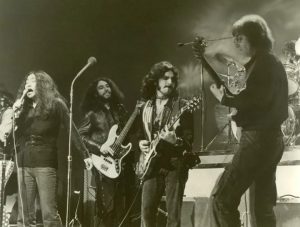 Will there be a DVD release of “Live in New York City” soon?
Will there be a DVD release of “Live in New York City” soon?
I think we are getting really close. Yoko seems to go in circles, of like 5 years circles. It is due. I have heard some things, I don’t want to divulge anything here. I will be the last person to know the final release date, but I just met my friend Jack Douglas (ed: Aerosmith producer, engineer in Lennon’s early solo albums and producer in “Double Fantasy” album-1980) and I know that it will be released soon. We worked with Jack Douglas on Yoko’s album “Approximately Infinite Universe” (ed: recorded in November/December 1972).
What kind of influence Yoko had on John and the band?
Of course she had a huge influence on John because of their relationship, you know. As far as the musical side, she usually worked with John while I was around. Yoko had clues, had an idea of what she wanted. We didn’t really know what to expect. I consider her as one of the early-early leaders in women’s liberation. She was way ahead then. As far as the band goes, we were all pretty solid studio players, so I didn’t get any musical influence from Yoko. We were in the studio for weeks for her record (ed: “Approximately Infinite Universe”) and she used to do stuff like sending flowers to our wives, sending them to Bloomingdale’s, which is a very famous shopping store here in New York City, and send them notes for them and things like that. She had been very considered of the ladies, of the wives of the band. I will never forget her. She was great. I mean, how many partners do that?
John Lennon produced Elephant’s Memory second self-titled album in 1972. What do you remember the most of these sessions?
The fact that he really liked one of my songs. He sent everyone home and he came up with some piano lines for one of my songs that I had written. So, that was the highlight of the record for me. The song was called “Wind Ridge”. That was pretty special. It was just me and Jim Keltner (ed: Bob Dylan, George Harrison, Eric Clapton drummer) in the studio for a while.
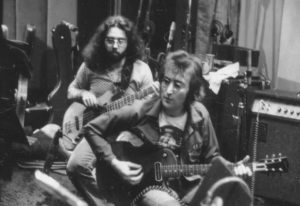 You performed with John Lennon and Chuck Berry on Mike Douglas Show in 1972. Do you consider this performance as one of the highlights of your career?
You performed with John Lennon and Chuck Berry on Mike Douglas Show in 1972. Do you consider this performance as one of the highlights of your career?
No, as I have said I think the highlight of my career was playing at the Garden with John. The strength of his performance and the way we can view it. It was historical. The Mike Douglas Show was right up there. We had a lot of fan. I can tell you a quick story: We were in the wings waiting to be on air on Mike Douglas very first week and Mike Douglas was like a ‘40s singer, with his standard tunes and stuff, you expected to see him singing like that, and he came out and he heard the band starting a jam with me, and I can’t forget the look we took at me.
Do you wish you did a full tour with John Lennon?
Of course, we were all gearing up for it. He had bought equipment, we had bought the gear and Apple (ed: The Beatles label) paid for all the stuff. I think it was over $100.000 with the gear and we just never had a tour because of the Green Card situation, that was the problem. We were ready to go.
Why did you stop playing with John Lennon in 1973?
Because he moved to L.A. He took up a relationship with May Pang. That was one of the reasons. We were in New York, we lived in New York and he relocated for a year and a half. But the second reason was that Apple was in turmoil, totally at that time and they had given him a lot of bad talk regarding the budget, because we were on salary to Apple and we were costing them a lot of money. It was a time considering his personal life. It had nothing to do with us.
Is it true that John Lennon hated the sound of his voice?
During the years I had been working with him, I had never heard of that.
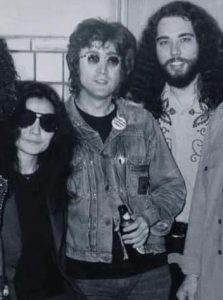 I think George Martin (The Beatles producer) had said that too. That’s why John Lennon used to do double-tracking, because he hated his voice.
I think George Martin (The Beatles producer) had said that too. That’s why John Lennon used to do double-tracking, because he hated his voice.
It might had happened that, but not with me. If Mr Martin says that, he was there. Thank God for it, because it’s just a great technique. One of the things he did and talked me about when he was writing the piano lines for my song, “Wind Ridge”, he double and triple-tracked my vocals (laughs).
Maybe he felt insecure about his voice.
He just gave it a good sound. It worked out.
I really love John’s double-tracking especially in songs like “A Day In the Life” and “Tomorrow Never Knows”!!
Yeah, in these songs his voice is haunting.
Do you have any tapes from your jam sessions with Mick Jagger?
I have a couple of live things that we used to play at the Record Plant. Just personal stuff. I guess it’s probably out there in some bootleg, if you know what I mean. I have been told that it’s out there. It was just a jam with John and Mick on guitars which were a little out of tune. It is not really a big deal.
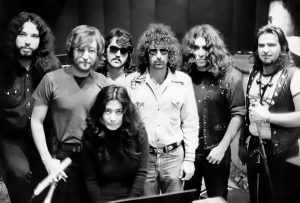 When and how did it happen to play with Bo Diddley?
When and how did it happen to play with Bo Diddley?
We met Bo Diddley through Chuck Berry, actually. They had just performed together, but it was just a little more than that. Initially we met him through the Hells Angels, because he used to hang around in all those gigs here in New York City. One night we opened and we ended up backing him up. We started a great relationship and we played with him in ’72 and ’73.
Do you remember any crazy Keith Moon (The Who drummer) story?
Yeah, I’m an insider. We played a concert in Los Angeles on a huge scene for 80.000 people. We were around L.A Coliseum, we strolled with a little Volkswagen trying to find out how to get in the Coliseum for the soundcheck. And all of a sudden we see somebody who is climbing the vines. Have you ever seen L.A Coliseum? There are vines that grow up in and near there. It was Keith Moon who had climbed up those vines, he was totally drunk and he was trying to get in the Coliseum by climbing the door that led to the soundcheck. We got him down and got him into the car, he spoke out of his mind and I remember that the first thing he did when he came up to the Coliseum, was that he came out as a drag (laughs).
Why Hells Angels loved Elephant’s Memory so much?
They loved the band. They went to all of our gigs. We were accepting of them. We respected them and they respected us. It was just a good relationship. They were looking for a band to become the “East Coast Grateful Dead”. There was a West Coast Chapter and they hung out with the Grateful Dead. They were looking for a band that had a similar kind of jam, that had a certain kind of crowd. They just loved us. We just looked too good to them and I ended up writing a song for the soundtrack “Angels Forever”, which was named after one of my songs.
Had you ever met Andy Warhol?
No, I was never fortunate but he did meet Elephant’s Memory at some point.
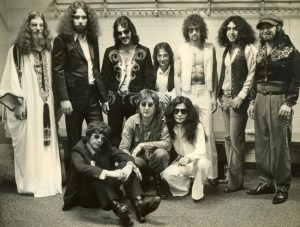 Because I ‘ve seen one photo by Bob Gruen with John and Andy Warhol from the “Some Time In New York City” sessions at Record Plant studio.
Because I ‘ve seen one photo by Bob Gruen with John and Andy Warhol from the “Some Time In New York City” sessions at Record Plant studio.
Right, right. Personally, I had never met him but I’m sure a couple of the other guys in Elephant’s Memory they did meet him.
Are you still giving bass lessons?
Definitely. I have some students and I am teaching them in three locations here in New Jersey.
Do you believe that popular music which was written in the ‘60s and ‘70s was much better than today’s music?
Not necessarily. It all has a good point. All good.
What kind of music are you listening to at the moment?
I have to listen to almost every decade and every style of music just because of my students. I’m teaching them the better things. They keep me busy and I’m listening to the new music. I have to teach my jazz students, jazz, R’n’B, slapping. All the styles they are going to work nowadays.
A huge “THANK YOU” to Mr Gary Van Scyoc for his time.
Official Gary Van Scyoc website: http://www.garyvanscyoc.com
Official Gary Van Scyoc Facebook page: https://www.facebook.com/pages/Gary-Van-Scyoc-Fan-Page/108598539206689
Buy Gary’s book “Shortcuts to Improving Your Bass Playing” here: http://www.garyvanscyoc.com/store_book.asp

